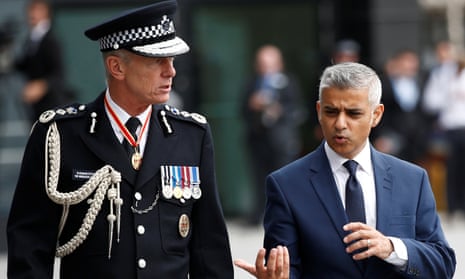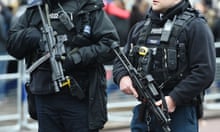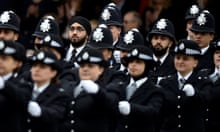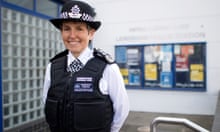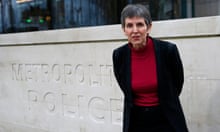Another day another departure. If it’s not a prime minister, a party leader or a national football manager, it’s a police chief. The news that Sir Bernard Hogan-Howe will be leaving his job as commissioner of the Metropolitan police is just the latest indication that it’s tougher at the top these days than in the gentler times when senior coppers slipped quietly away after a jolly retirement party at Scotland Yard.
Sir Bernard took on the job five years ago in the wake of the departure, in quick succession, of Ian Blair and Paul Stephenson, the former destabilised by the then mayor, Boris Johnson, the latter in the wake of what was deemed to be a poor police response to the hacking scandals exposed by the Guardian. To that extent he has at least lasted the course and will doubtless soon be able to find himself a comfortable home in the security industry, away from the daily crises that come with his current post.
The betting at the moment seems to be on there being, for the first time, a woman as commissioner. Various names have been mentioned, from the much admired Sara Thornton to – despite denials – Lynne Owens and Cressida Dick, although the latter is no longer a police officer. A female prime minister and a female home secretary may well feel that it is about time that the capital city followed the examples set successfully over the last decade by provincial forces and appointed a woman to the helm.
Whoever it may be should start by repairing relations with the media, whose cooperation is vital to the Met’s work. In 2012, Hogan-Howe famously embraced the controversial report into relations between the police and the media commissioned by the then home secretary, Theresa May, and headed by Dame Elizabeth Filkin. “There should be no more secret conversations,” said Sir Bernard at the time of the Filkin report’s publication, agreeing that too many detectives were too chummy with the press. “There should be no more improper contact and by that what I mean is between the police and the media – that which is of a selfish, rather than a public interest. Meetings will no longer be enhanced by hospitality and alcohol.”
Ah, those secret conversations – by which he meant that detectives should not be having chats with crime correspondents without having a press officer present and certainly should not be popping down to the pub with a reporter after a day at the Yard. While previous commissioners had briefed crime correspondents on a more or less regular monthly basis, Sir Bernard ended the practice and made clear his distaste for much of what the media got up to. As a result, relations with the media in this post-Leveson world have rarely been chillier.
The new commissioner will have to make it clear that she – or he – is prepared to open the doors again in the way that Sir Robert Mark did so successfully back in the 1970s. They could do worse than to repeat Sir Robert’s credo: “Officers who speak in good faith may be assured of my support even if they make errors of judgment when deciding what information to disclose.”
To his credit, however, last year Sir Bernard did allow the BBC’s cameras to follow his officers in the series, The Met: Policing London. In doing so, he said that he was weary of the standard type of programme – “cops banging in doors, charging around with their blue lights on, a macho commentary … they are short on the informative side”. As a way of showing the difficulties of the job and the dangers faced by officers, the series was widely regarded as a success, so his risk was justified and should be repeated by the next office-holder.
The new person will also need to be someone who can win the confidence both of the home secretary, Amber Rudd, and, more importantly, the London mayor, Sadiq Khan, who is fresh from his triumphs on the other side of the Atlantic. Did he pick up any policing ideas there? He would not be the first mayor to imagine that a savvy American police chief might be the best way to shake up the Yard, although such a scenario – flirted with in the past – seems unlikely today.
Khan has already made it clear that he is his own man when it comes to decisions and he will doubtless want someone who reflects his view that the diversity of London requires a very special kind of sensitivity. No one who has watched the catastrophic breakdown in relations between the police and the public in too many big American cities will want to see the same kind of conflict repeated in London where our own riots are still fresh in the memory.
The old-school crimes which a commissioner had to prioritise in the past – the bank robberies that occurred on an almost daily basis – are much less of an issue these days when so much more theft is carried out by cybercriminals. So the new chief will also have to be someone who is not overwhelmed by the rather prosaic and unspectacular nature of investigating such offences.
And, of course, the top priority will be how the new person reacts when – not if – faced with their first major terror incident in the capital. Which is why the Met’s top counter-terrorism officer, Mark Rowley, is also now seen as a candidate.
Anyway, the faint-hearted need not apply.
